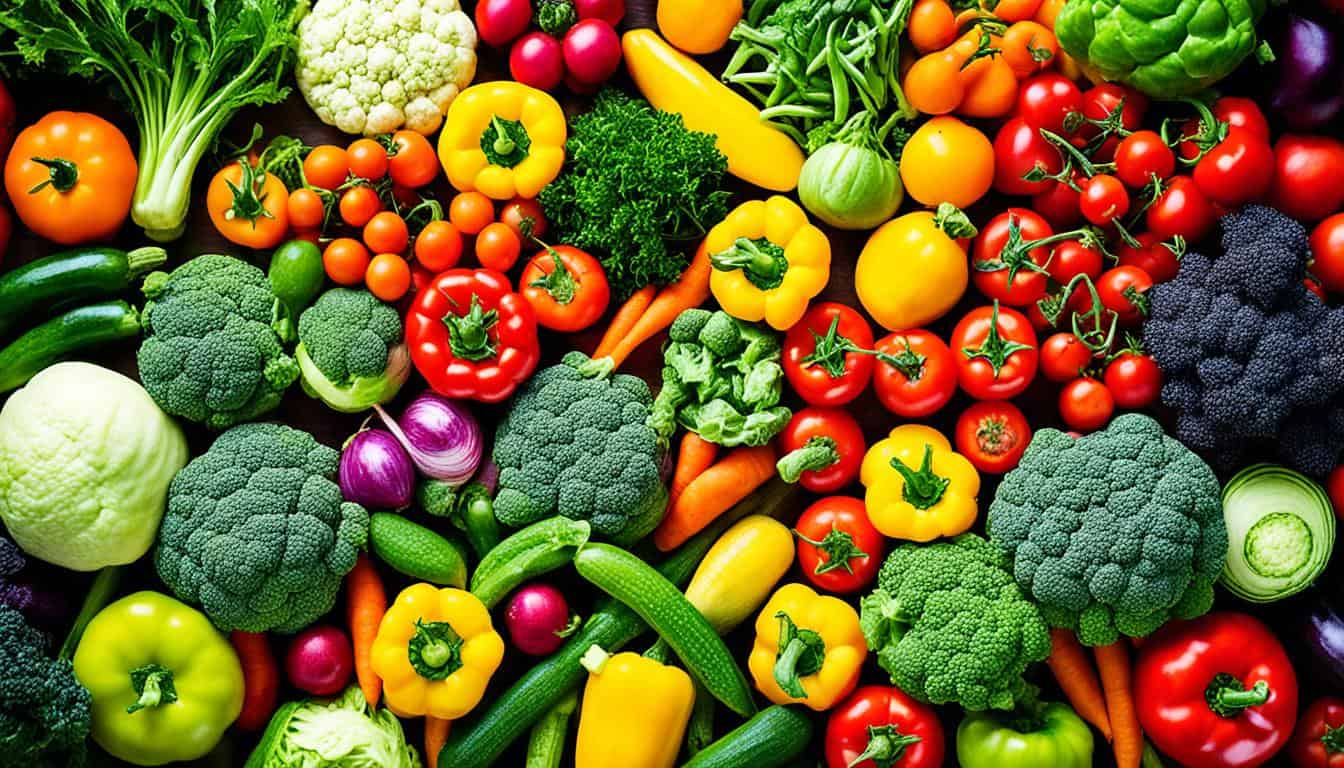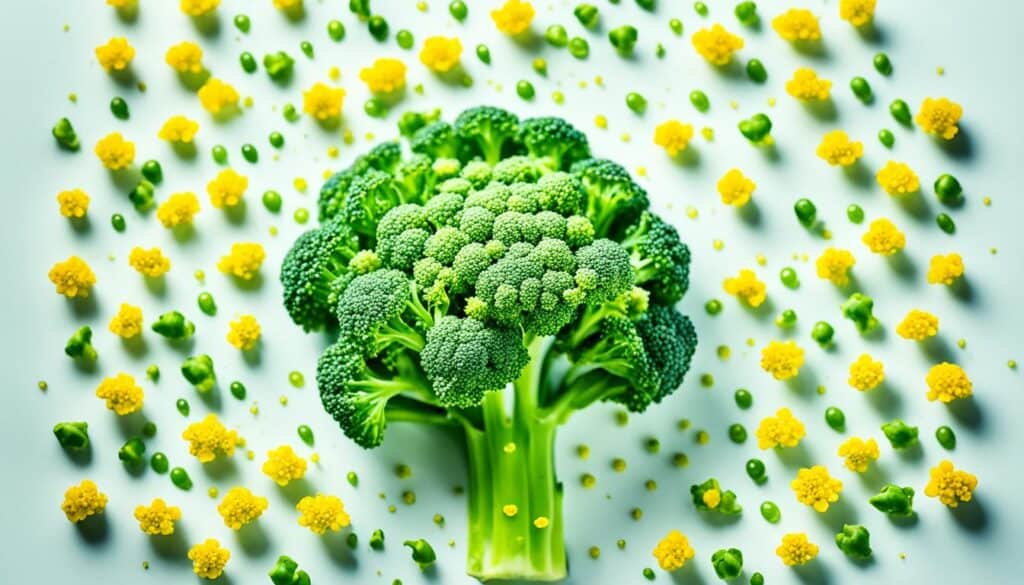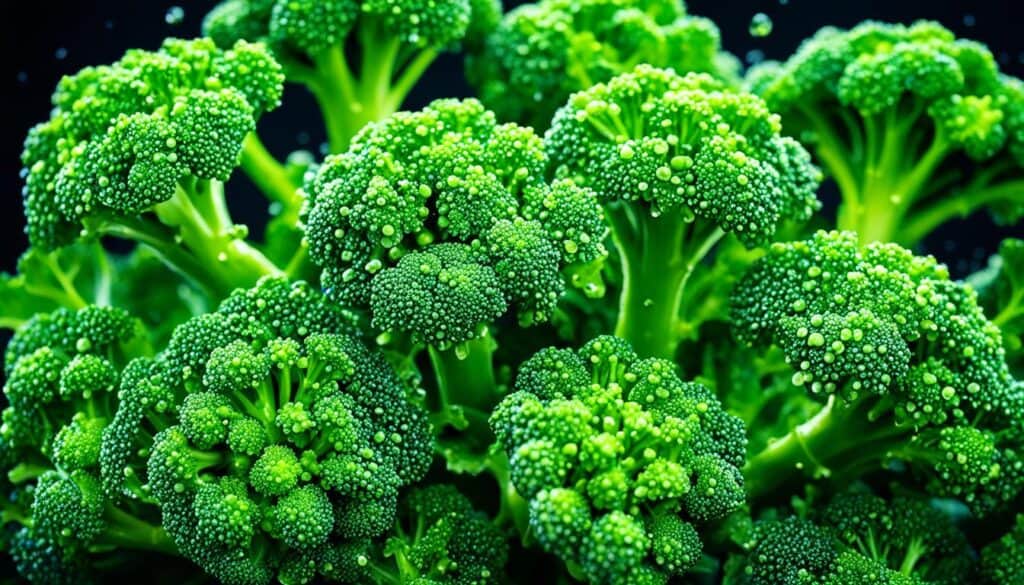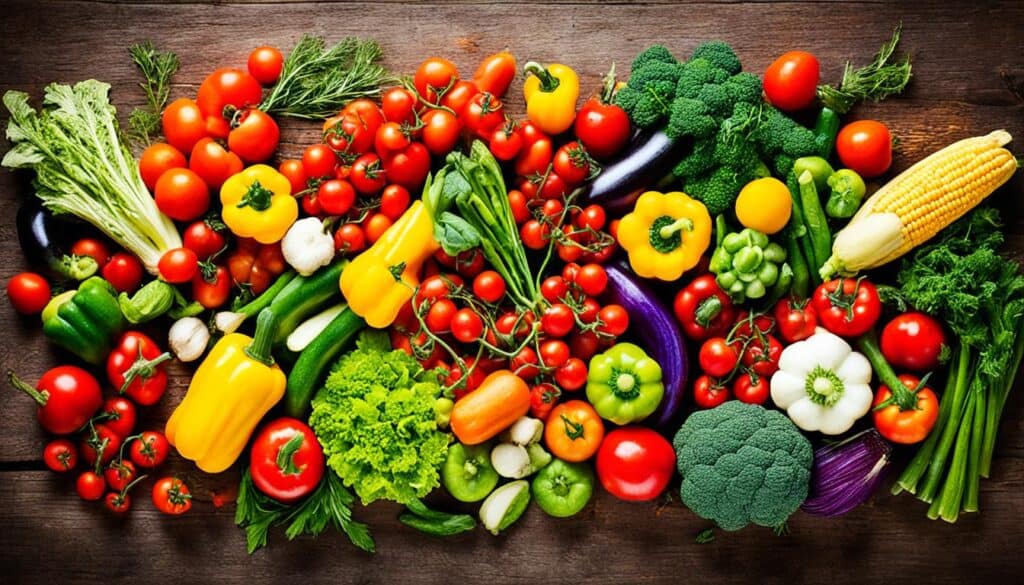Did you know that there are over 20,000 different edible vegetable varieties? From leafy greens to root vegetables, the world of all vegetables is vast and diverse. In this comprehensive guide, we will delve into the realm of vegetable gardening, explore tantalizing vegetable recipes, uncover the nutritional benefits of fresh and organic vegetables, and discover the joys of cooking with seasonal produce. Get ready to embrace the vibrant colors, flavors, and health benefits of all vegetables!
Key Takeaways:
- There are over 20,000 different edible vegetable varieties to explore
- This guide will cover vegetable gardening, delicious recipes, nutrition, and more
- Fresh, organic, and seasonal vegetables offer unique benefits
- Cooking with vegetables is a creative and nutritious way to enhance your meals
- Eating a variety of vegetables is essential for a healthy and balanced diet
The Power of Dark Green Leafy Vegetables
When it comes to nutrition and health benefits, dark green leafy vegetables reign supreme. These leafy greens are not only delicious but also packed with essential nutrients that can nourish your body and support overall well-being.
Dark green leafy vegetables, such as kale, spinach, and Swiss chard, are incredibly low in calories and high in fiber. This combination makes them excellent choices for weight management, as they can help you feel full and satisfied without adding unnecessary calories to your diet.
Beyond their calorie and fiber content, dark green leafy vegetables are rich in antioxidants and other important nutrients. They provide a powerhouse of vitamins, including vitamins A, B, C, and K. These vitamins are crucial for maintaining optimal health and supporting various bodily functions.
One of the key benefits of dark green leafy vegetables is their impact on heart health. The high fiber content helps to lower cholesterol levels and reduce the risk of cardiovascular diseases. Additionally, these vegetables contain potassium, which is known to support healthy blood pressure levels.
When it comes to bone health, dark green leafy vegetables are a top choice. They are excellent sources of calcium, a mineral essential for maintaining strong and healthy bones. In fact, some leafy greens like kale and collard greens are even higher in calcium than dairy products.
Did you know that dark green leafy vegetables are also great for your eyes? They contain antioxidants, such as lutein and zeaxanthin, which can help protect against age-related macular degeneration and cataracts. Including these vegetables in your diet can support long-term eye health.
Furthermore, the nutrients found in dark green leafy vegetables have been linked to brain health. They contain folate, which plays a vital role in cognitive function and mental health. Regular consumption of these vegetables has even been associated with a reduced risk of developing neurodegenerative diseases, such as Alzheimer’s.
To summarize, dark green leafy vegetables offer a wide range of health benefits. Their combination of nutrition, including vitamins, minerals, fiber, and antioxidants, can promote heart health, support bone health, aid in weight management, protect eye health, and even keep your brain young. Including these nutrient-dense greens in your diet is a simple and delicious way to optimize your overall well-being.
Reference:
“Dark green leafy vegetables are rich in essential nutrients like vitamins A, B, C, and K, calcium, iron, and folate. They provide numerous health benefits, ranging from heart health to brain health.” – American Journal of Nutrition
Greens Powders vs. Fresh Vegetables: Exploring the Differences
When it comes to meeting your daily vegetable intake, greens powders have emerged as a convenient option. These powdered formulations provide a concentrated dose of nutrients and are often marketed as a quick and easy way to boost your greens. However, it’s important to understand the differences between greens powders and fresh vegetables to make informed choices about your diet.
In terms of nutrient content, fresh vegetables reign supreme. They offer a diverse array of vitamins, minerals, and antioxidants that are essential for overall health. While greens powders do provide some nutrients, they are typically more limited in their range compared to fresh vegetables.
Fiber is another crucial component that sets fresh vegetables apart from greens powders. Fiber plays a vital role in maintaining digestive health, regulating blood sugar levels, and promoting satiety. Fresh vegetables are excellent sources of dietary fiber, while greens powders often lack this important component.
While greens powders can be a convenient way to supplement your diet, they should not be seen as a substitute for fresh vegetables. Fresh vegetables offer a wide range of benefits beyond nutrient content and fiber. They provide a sensory experience with vibrant colors, textures, and flavors that can enhance your meals and make them more enjoyable.
“While greens powders can be a convenient way to supplement your diet, they should not be seen as a substitute for fresh vegetables.”
Moreover, fresh vegetables offer a certain level of satisfaction and mindfulness that cannot be replicated by powders. Chewing and savoring fresh vegetables can contribute to a more mindful eating experience, allowing you to fully appreciate the natural goodness of these foods.
While greens powders may be a convenient option for individuals with busy lifestyles or limited access to fresh produce, their overall benefits cannot match those of fresh vegetables. For optimal health and well-being, strive to incorporate a diverse selection of fresh vegetables into your daily meals.
To summarize the differences between greens powders and fresh vegetables:
- Fresh vegetables provide a wider range of nutrients compared to greens powders.
- Greens powders often lack essential dietary fiber, which is abundant in fresh vegetables.
- Fresh vegetables offer a sensory experience with vibrant colors, textures, and flavors.
- Chewing and savoring fresh vegetables can contribute to a more mindful eating experience.
So, while greens powders may offer convenience, they cannot fully replace the nutritional value and overall experience of consuming fresh vegetables.
The Convenience Factor
One of the main advantages of greens powders is their convenience. They can be easily mixed with water, juice, or smoothies, providing a quick and efficient way to consume a concentrated dose of nutrients. This makes greens powders a convenient option for individuals who may struggle to incorporate enough fresh vegetables into their daily diet.
However, it’s important to note that convenience should not be the sole determining factor when it comes to choosing between greens powders and fresh vegetables. While greens powders may save time and effort, they cannot match the overall nutritional value and sensory experience offered by fresh vegetables.
The Nutritional Profile of Broccoli
Broccoli, a cruciferous vegetable, boasts a unique nutritional profile. It is rich in antioxidants, such as sulforaphane, which contribute to its anti-inflammatory properties. Broccoli is also a good source of fiber, vitamins C and K, and essential minerals. While it may not fit the traditional image of a green leafy vegetable, its nutritional merits are undeniable.
When it comes to the nutritional powerhouse that is broccoli, it’s fascinating to explore its impressive range of health-boosting components. Take a closer look at the key nutrients found in this humble vegetable:
| Nutrient | Amount per 1 cup (91g) |
|---|---|
| Antioxidants | High levels of sulforaphane contribute to its anti-inflammatory properties |
| Fiber | 2.6 grams, which aids in digestion and helps maintain a healthy weight |
| Vitamin C | About 135% of the daily recommended intake, supporting immune function and collagen production |
| Vitamin K | About 116% of the daily recommended intake, crucial for blood clotting and bone health |
| Calcium | Over 40 milligrams, contributing to strong bones and teeth |
The Power of Antioxidants in Broccoli
One of the key factors that sets broccoli apart from other vegetables is its impressive antioxidant content. Antioxidants play a vital role in protecting the body from cellular damage caused by harmful molecules called free radicals. Broccoli contains notable levels of sulforaphane, which has shown potent antioxidant effects and is linked to various health benefits, including reduced inflammation and a lower risk of chronic diseases.
“Broccoli is a powerhouse of antioxidants, supporting the body’s defense against free radicals and promoting overall health.”
In addition to antioxidants, broccoli also provides a significant amount of dietary fiber. Fiber is essential for maintaining a healthy digestive system, regulating blood sugar levels, and supporting weight management. The combination of antioxidants and fiber in broccoli makes it an excellent addition to any balanced diet.
Next, let’s explore the role of broccoli’s high vitamin content in promoting overall health and wellbeing.
The Versatility of Broccoli in Culinary Applications
When it comes to culinary versatility, broccoli stands out from some leafy greens. This cruciferous vegetable can be used in a wide variety of dishes, adding not only texture and flavor but also valuable nutritional benefits. Whether you’re making stir-fries, casseroles, soups, or salads, broccoli has the power to elevate your meals to the next level. Let’s explore the many ways you can enjoy cooking with broccoli and get some recipe inspiration.
Roasted Broccoli with Parmesan Cheese
One simple yet delicious way to enjoy broccoli is by roasting it. Toss the florets in olive oil, sprinkle with salt, pepper, and grated Parmesan cheese, and roast in the oven until they’re tender with a crisp exterior. The roasting process brings out the natural sweetness of the broccoli and adds a delightful nutty flavor.
Broccoli and Cheddar Soup
Warm up with a comforting bowl of broccoli and cheddar soup. Sauté onions, garlic, and chopped broccoli in butter until soft. Add vegetable broth and simmer until the broccoli is tender. Then, blend the mixture until smooth, stir in shredded cheddar cheese, and season to taste. This creamy and cheesy soup is perfect for cozy evenings.
Broccoli Stir-Fry with Garlic and Ginger
Add a burst of freshness to your meals with a vibrant broccoli stir-fry. Heat oil in a wok or skillet, and stir-fry the broccoli florets with garlic, ginger, and your choice of protein (such as chicken, tofu, or shrimp). Finish with a drizzle of soy sauce or oyster sauce for a savory umami flavor. Serve over steamed rice or noodles for a satisfying meal.
Broccoli and Quinoa Salad
Create a nutritious and colorful salad with a base of cooked quinoa and steamed broccoli. Toss in cherry tomatoes, diced cucumbers, sliced red onions, and your favorite leafy greens. Drizzle with a zesty lemon vinaigrette and sprinkle with feta cheese or toasted almonds for added crunch.
| Recipe | Dish | Preparation Time |
|---|---|---|
| Roasted Broccoli with Parmesan Cheese | Side dish | 25 minutes |
| Broccoli and Cheddar Soup | Main course | 40 minutes |
| Broccoli Stir-Fry with Garlic and Ginger | Main course | 20 minutes |
| Broccoli and Quinoa Salad | Salad | 30 minutes |
These are just a few examples of how you can incorporate broccoli into your culinary adventures. Experiment with different cooking methods, spices, and ingredients to discover new and exciting flavor combinations. With its versatility and nutritional value, broccoli is a fantastic addition to any recipe.
The Value of Fresh Vegetables Over Greens Powders
When it comes to choosing between greens powders and fresh vegetables, there’s no doubt that fresh vegetables offer superior nutrient density and overall health benefits.
Fresh vegetables are nature’s powerhouse, providing a wide range of essential vitamins, minerals, and phytonutrients that contribute to optimal health and well-being. These nutrient-dense foods are packed with antioxidants and other beneficial compounds that support various bodily functions.
“Fresh vegetables are not only delicious but also offer a treasure trove of health-promoting compounds that are difficult to replicate in any other form.” – Dr. Sarah Thompson, Nutritionist
One of the key advantages of fresh vegetables is their high fiber content. Fiber plays a crucial role in digestion and gut health, promoting regular bowel movements and preventing constipation. It also helps control blood sugar levels, promotes satiety, and supports a healthy weight.
While greens powders may be convenient and offer a concentrated source of certain nutrients, they should not replace fresh vegetables in your diet. Greens powders lack the complexity and variety of nutrients found in fresh vegetables, including the countless phytonutrients that provide unique health benefits.
Here is a comparison of the nutrient density and health benefits of fresh vegetables versus greens powders:
| Nutrient | Fresh Vegetables | Greens Powders |
|---|---|---|
| Vitamins | Rich and varied vitamin profile | May contain certain vitamins, but not as diverse as fresh vegetables |
| Minerals | Abundant in essential minerals | May contain some minerals, but not as comprehensive as fresh vegetables |
| Phytonutrients | Provide a wide range of plant compounds with unique health benefits | Lack the complexity and diversity of phytonutrients found in fresh vegetables |
| Fiber | Excellent source of dietary fiber necessary for digestion and overall well-being | May not provide significant amounts of fiber |
Note: The nutrient content of greens powders can vary based on the brand and formulation. It’s important to choose reputable brands and read the labels carefully to understand the specific nutrient profile.
While greens powders can be considered as a supplement to support overall nutrition, they should not be relied upon as a substitute for fresh vegetables. Incorporating a variety of fresh vegetables into your daily meals ensures that you receive a broad spectrum of nutrients that contribute to your overall health and vitality.
Broccoli: A Nutritional Powerhouse
When it comes to nutrient-packed vegetables, broccoli takes the crown as a true powerhouse. This green cruciferous vegetable is not only delicious but also offers a plethora of nutritional benefits that contribute to overall health and well-being.
One of the standout features of broccoli is its abundance of antioxidants. These powerful compounds help protect the body against oxidative stress and inflammation, reducing the risk of chronic diseases. By incorporating broccoli into your diet, you can boost your antioxidant intake and support a healthy immune system.
Broccoli is also an excellent source of fiber, which plays a vital role in maintaining digestive health. A diet rich in fiber promotes regular bowel movements, supports gut health, and may even help with weight management. By adding broccoli to your meals, you can increase your fiber intake and enjoy a healthy digestive system.
In addition, broccoli is packed with essential vitamins and minerals that are crucial for optimal health. It is a fantastic source of vitamin C, known for its immune-boosting properties and ability to promote collagen production in the body. Broccoli is also rich in vitamin K, which supports bone health and helps with blood clotting.
When it comes to minerals, broccoli shines with its high content of potassium, calcium, and iron. Potassium is essential for maintaining heart health and regulating blood pressure, while calcium supports strong bones and teeth. Iron is crucial for the production of red blood cells, which transport oxygen throughout the body.
No matter how you choose to prepare broccoli – steamed, roasted, or in a stir-fry – you can be confident that you are fueling your body with a nutrient-dense vegetable that offers a wide array of health benefits.
So, next time you’re planning your meals, be sure to include broccoli for its nutritional prowess. Whether you’re looking to support immune function, aid digestion, or promote bone health, broccoli is a versatile and delicious addition to any balanced diet.
The Role of Vegetables in Weight Management
When it comes to weight management, vegetables are your secret weapon. Not only are they delicious and versatile, but they also provide essential nutrients while being low in calories. Incorporating a variety of vegetables into your meals can support your weight management goals and keep you feeling satisfied.
One of the key factors that make vegetables ideal for weight management is their low calorie content. Unlike calorie-dense foods, such as sugary snacks or processed foods, vegetables pack a nutritional punch without adding excessive calories to your diet. You can enjoy their abundance without worrying about the numbers on the scale.
But it’s not just about the low calorie count; vegetables are also high in fiber. Fiber is known for its ability to promote satiety, keeping you feeling full and reducing the urge to overeat. By including vegetables in your meals, you’re adding bulk to your diet without adding unnecessary calories.
The nutrient density of vegetables is another crucial aspect to consider. While some foods may provide empty calories, vegetables are rich in essential vitamins, minerals, and antioxidants. These nutrients are vital for overall health and well-being, supporting various bodily functions and promoting optimal metabolism.
Let’s take a closer look at how vegetables contribute to weight management:
- Low Calorie: Vegetables are naturally low in calories, making them a smart choice for weight-conscious individuals.
- High Fiber: The high fiber content of vegetables helps control appetite and keeps you feeling full for longer.
- Nutrient Density: Vegetables are packed with essential nutrients, ensuring your body gets what it needs while managing weight.
| Vegetable | Calories per Serving | Fiber Content per Serving |
|---|---|---|
| Spinach | 23 | 2.2g |
| Broccoli | 55 | 2.6g |
| Kale | 33 | 2.4g |
| Carrots | 41 | 2.9g |
By incorporating a variety of vegetables, such as spinach, broccoli, kale, and carrots, into your meals, you’re ensuring a nutrient-dense diet with low-calorie options. This combination can help you achieve and maintain a healthy weight.
“Vegetables are nature’s weight management allies. They provide essential nutrients, fill you up, and help you reach your weight goals.” – Nutritionist Jane Smith
Quick Tips for Including More Vegetables in Your Diet:
- Add leafy greens to smoothies or omelets for an extra boost of nutrients.
- Snack on crunchy vegetables, like carrots and bell peppers, with a healthy dip or hummus.
- Create colorful salads with a variety of vegetables and a lean protein source.
- Try swapping traditional pasta with spiralized zucchini or other vegetable noodles.
- Roast mixed vegetables with a drizzle of olive oil and your favorite herbs for a flavorful side dish.
Remember, vegetables are not only good for your waistline but also for your overall health. So, make them the star of your meals and enjoy the benefits they bring to your weight management journey.
The Benefits of Organic and Seasonal Vegetables
When it comes to choosing vegetables, opting for organic and seasonal options provides a multitude of benefits. Let’s explore why incorporating organic and seasonal vegetables into your diet is a wise and sustainable choice.
Benefits of Organic Vegetables
Organic vegetables are grown without the use of synthetic pesticides and artificial fertilizers. This means that they are free from potentially harmful chemicals that can have adverse effects on our health. By choosing organic vegetables, you can reduce your exposure to pesticides and enjoy produce that is natural and pesticide-free.
Benefits of Seasonal Vegetables
Seasonal vegetables are harvested at their peak freshness, delivering superior taste, texture, and nutritional value. Since they are grown and harvested within their natural growing season, they are packed with flavor and nutrients. The taste of seasonal vegetables is unmatched, providing a truly satisfying culinary experience.
The Environmental Impact
When you prioritize local and seasonal produce, you contribute to reducing the environmental impact of transportation. Seasonal vegetables are often sourced from local farmers, minimizing long-distance shipping and reducing carbon emissions. By choosing local and seasonal vegetables, you play a vital role in supporting sustainable farming practices and minimizing the carbon footprint associated with food transportation.
The Freshness Factor
Organic and seasonal vegetables offer unparalleled freshness. Since they are not subjected to long storage times or extensive transportation, they maintain their optimal freshness and nutritional value. The immediate availability of seasonal vegetables ensures that you get the best taste and quality, enhancing the overall dining experience.
The Taste and Nutritional Benefits
The combination of organic farming practices and seasonal harvesting results in vegetables that are bursting with flavor and nutritional goodness. Organic vegetables tend to have a more robust and vibrant taste, while seasonal vegetables are known for their rich and distinct flavors. The nutritional content of these vegetables is at its peak, providing an excellent source of vitamins, minerals, antioxidants, and other essential nutrients.
| Benefits of Organic Vegetables | Benefits of Seasonal Vegetables |
|---|---|
| Reduced exposure to pesticides and harmful chemicals | Superior taste and flavor |
| Natural and pesticide-free | Peak nutritional value |
| Support for sustainable farming practices | Reduced environmental impact |
| Enhanced freshness and quality | |
| Rich in vitamins, minerals, and antioxidants |
Incorporating organic and seasonal vegetables into your diet is a win-win situation. Not only do you reap the benefits of wholesome, pesticide-free produce, but you also contribute to sustainability and support local farmers. So, elevate your meals with the freshness, taste, and nutritional power of organic and seasonal vegetables.
Conclusion
Eating a variety of vegetables is essential for maintaining a well-rounded and healthy diet. With a wide range of vegetable varieties and the benefits of vegetable gardening, there are endless possibilities to explore and enjoy all vegetables. Whether you prefer the freshness of organic produce or the flavors of seasonal vegetables, incorporating vegetables into your meals offers numerous health benefits.
From improving heart health to supporting weight management, vegetables play a vital role in maintaining a balanced diet. Their rich nutritional profile, including vitamins, minerals, and fiber, contributes to overall well-being. By embracing the vibrant world of all vegetables, we can unlock the joy of gardening, cooking, and savoring these nutritional powerhouses.
So let’s celebrate the diversity of fresh, organic, and seasonal vegetables and make them a central part of our culinary adventures. By exploring vegetable recipes and understanding vegetable nutrition, we can enhance our meals while reaping the countless benefits of eating vegetables.










Leave a Reply